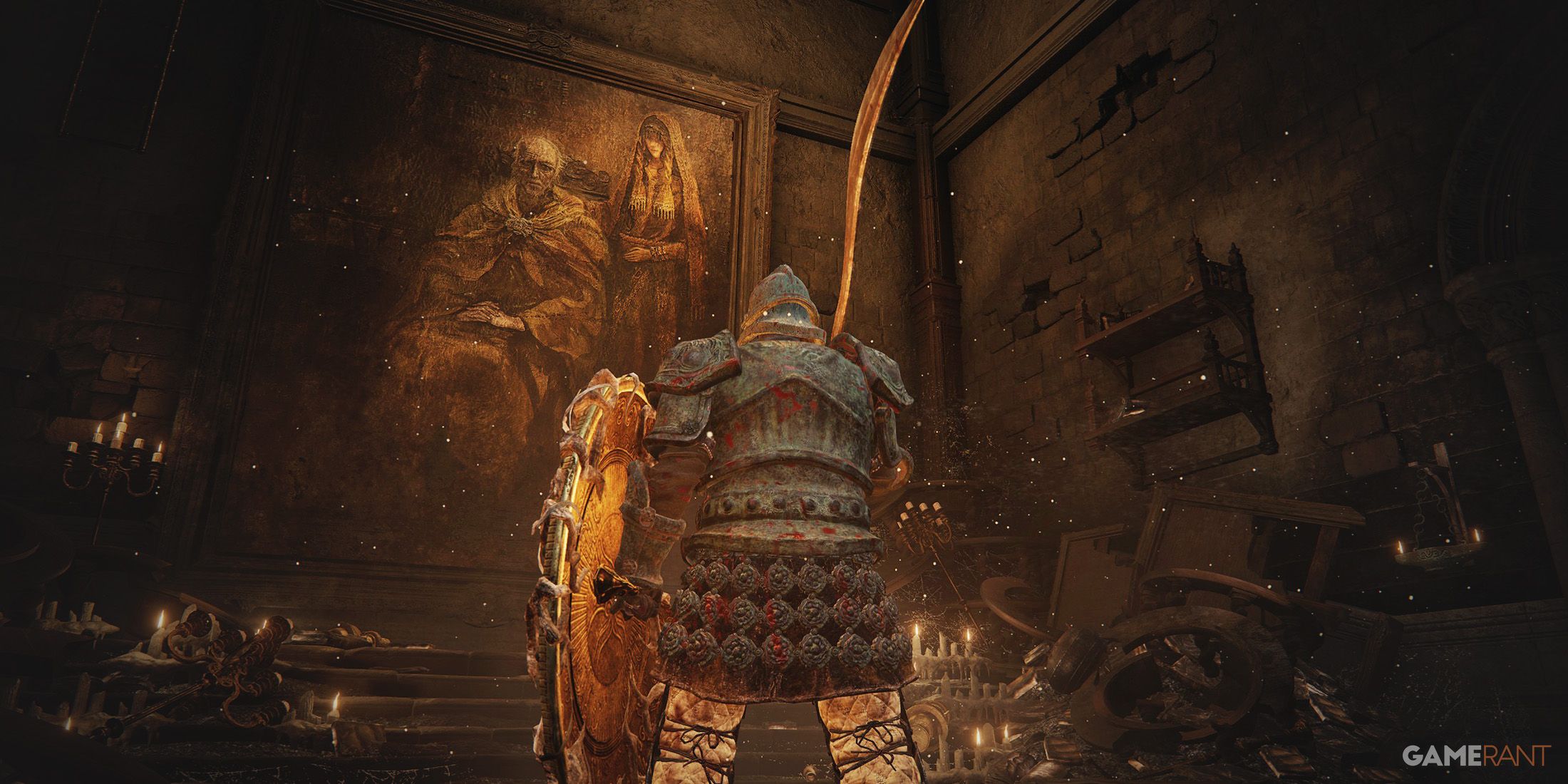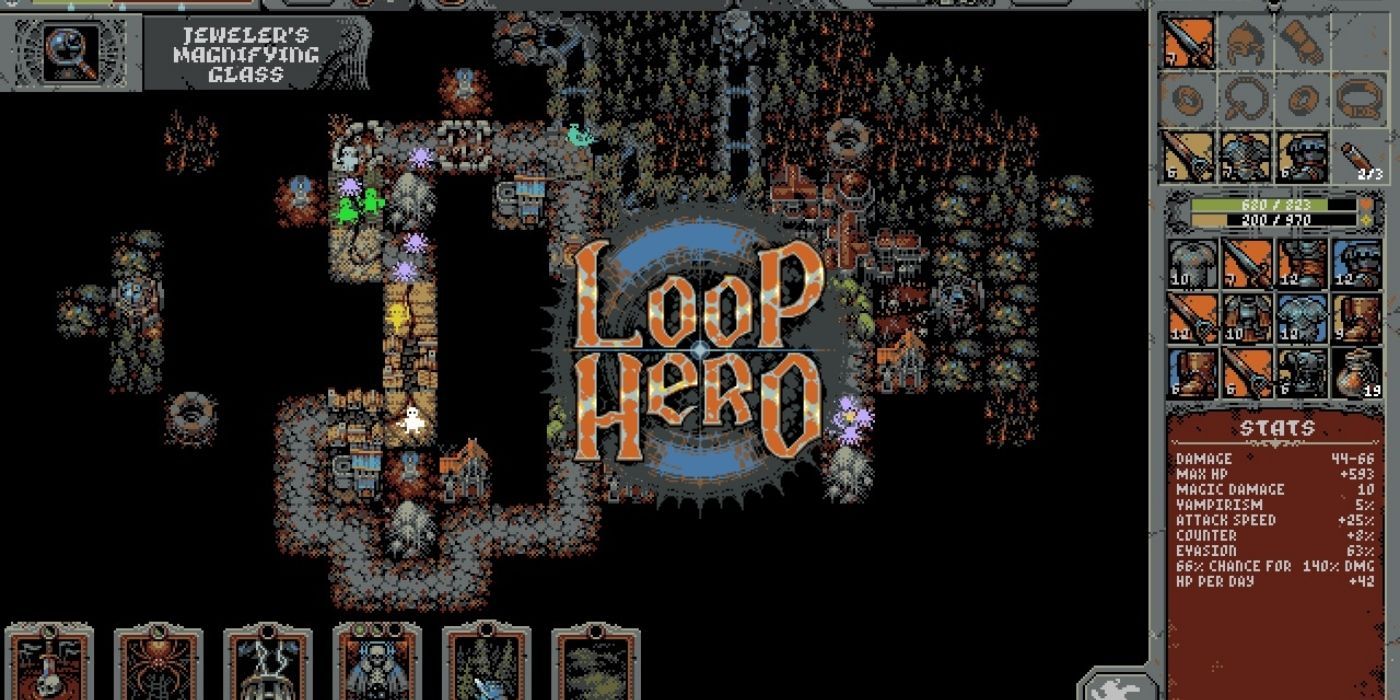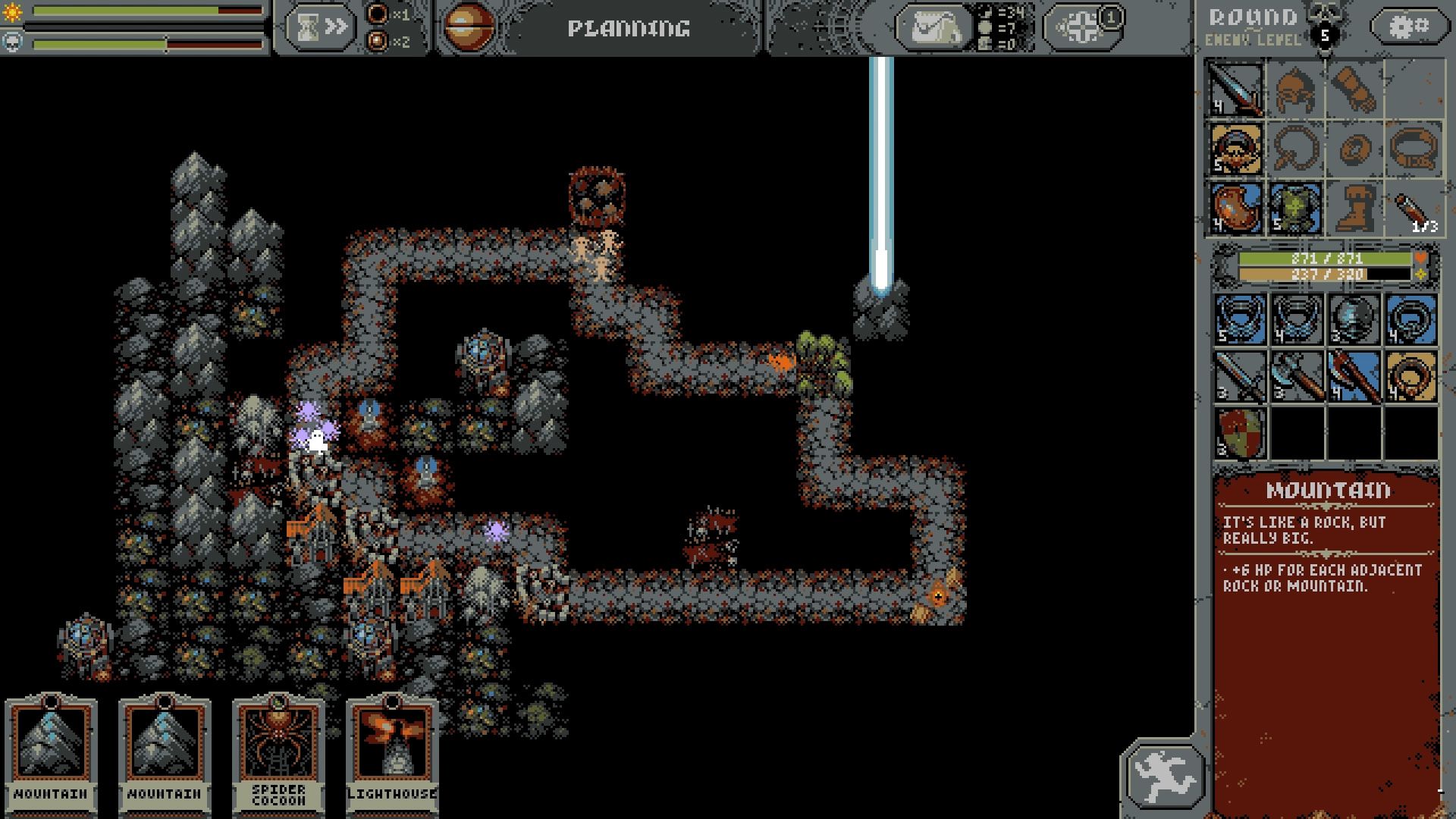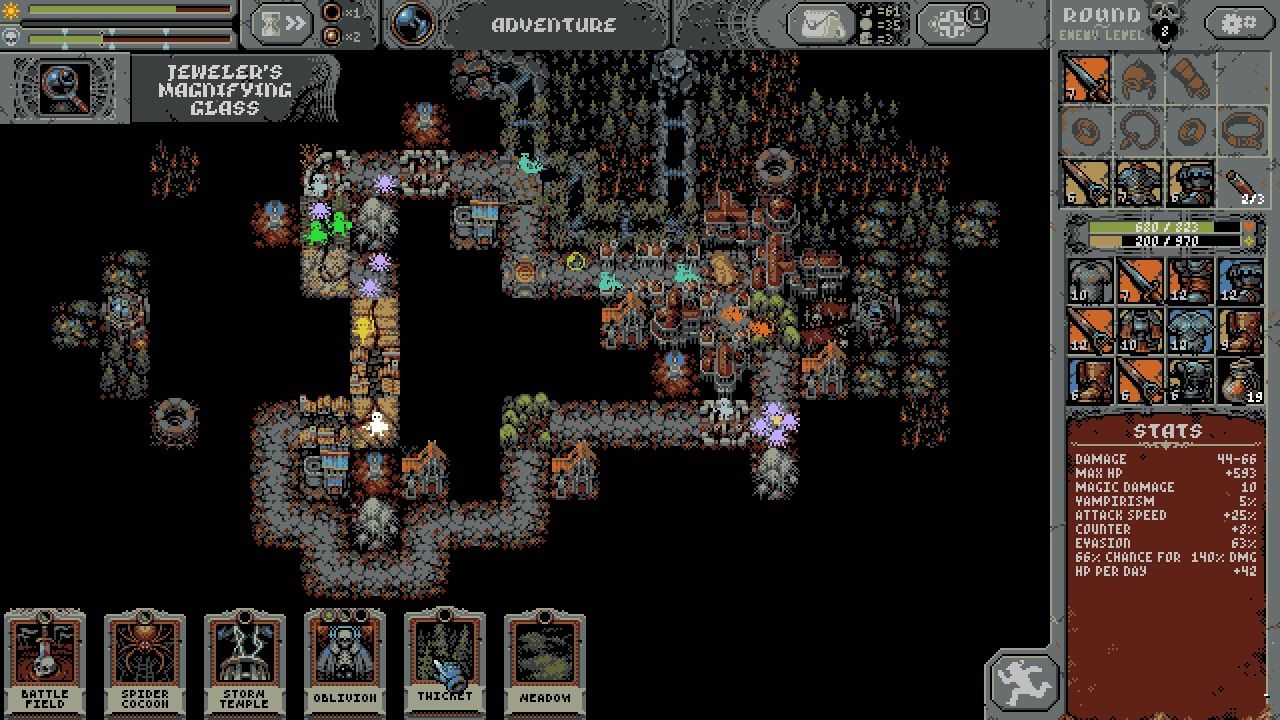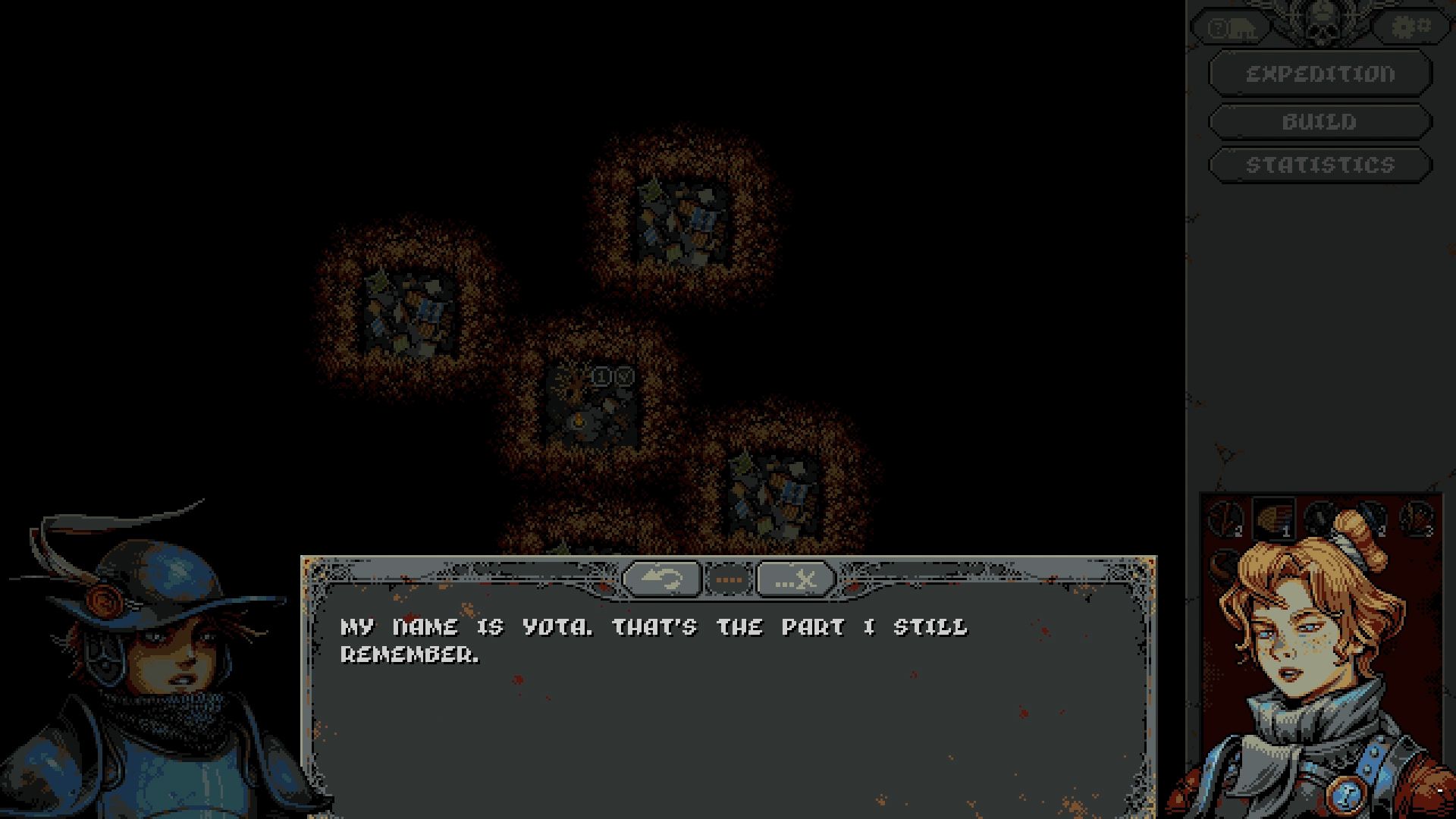Devolver Digital's Loop Hero may look a little odd at first glance. Compared to the graphical fidelity of triple A titles, it looks like what one would expect of an indie game, but if fans have learned anything from the best indie games of 2020, it's that they shouldn't judge a book by its cover. Underneath the quirky appearance of this title is a treasure trove of unique mechanics that most players have probably never seen. They take a bit of time to get used to, and even longer to master fully, but ultimately serve to enrich the gameplay in interesting ways.
For the uninitiated, Loop Hero is a rogue-like RPG that combines elements of deckbuilding and exploration to create a new experience altogether. The developer, Four Quarters, is relatively new to the scene, but the game's publisher is more well known. Devolver Digital is also known for titles such as Mediatonic's Fall Guys: Ultimate Knockout and even other accomplished roguelikes such as Dodge Roll's Enter the Gungeon. Loop Hero is probably unlike anything players have ever seen, but depending on the type of gameplay they enjoy, that may actually be a really good thing in the end.
World Generation Midgame
One of the cornerstones of the rogue-like genre is procedurally generated levels that are different every time the player progresses through them. They'll often share similar elements each time such as a specific enemy pool or biome type, but the actual layout of the level is always different. Loop Hero takes this a step further, allowing players to generate the world manually every run. The shape of the loop itself is randomly generated, but more importantly players decide what types of landmarks, enemies, and treasures they'll be dealing with over the course of the run.
This is accomplished with cards that players get as they win battles. Initially, the loop is barren other than the player's campfire and a handful of slimes, but with each slime defeated players have a chance to earn terrain cards. These cards don't have any cost to play, and therefore can be played immediately, although that isn't always a great idea. While building a Grove along the loop may seem like a good idea as a way to get more wood, it will also cause ratwolf enemies to spawn once a day. Alone these aren't too much of a problem, but when paired with slimes or other ratwolves from neighboring groves, they can be overwhelming (in a good way).
To Build or Not to Build
This gets down to the core of what Loop Hero is, a game about making choices. Players don't need any kind of immense skill in order to win fights as they are done automatically, but instead it's all about what choices the player makes that determines how successful they are. For example, every mountain terrain tile that players build into the background of the map provides a bonus to their maximum HP, but if they build nine mountains in a 3x3 area, things change.
Players now have a mountain peak, a terrain feature that gives even more health but also causes harpies to spawn on a regular basis and hunt down the player. This can be both good and bad, as the harpies drop more powerful gear than other things the players are fighting at this point but are also much more difficult to take down. This sort of give and take is what Loop Hero thrives on, presenting players with hard choices that are still fun to make. Of course, it isn't all difficult like this, as there are some items that are purely beneficial to the player. For example, the lighthouse will never hurt the player, and should be built as soon as possible.
Loop Hero's World Generation Application
To make things even better, players have no cause for concern when building the world around them. After the run is finished, whether because the player died and was forced to retreat or they voluntarily returned to their camp, the world around them will return to empty nothingness. The next time players venture out on an expedition, the loop will look different than before, and they'll have a chance to build things anew.
Usually the loss of progression in rogue-like games is one of the harsher aspects of the genre, but Loop Hero finds a way to turn that onto its head. Players are able to experiment without fear of permanently ruining anything in their game, and they can use this experimentation to fine tune certain strategies. Even death isn't a major punishment in Loop Hero, as it simply causes players to lose part of the materials they gathered on that run and doesn't affect the player's permanent settlement or anything else like that.
8-bit Existentialism
Through all of this, these mechanics weave their way into the story to provide a thought-provoking narrative on existentialism. The world of Loop Hero has been wiped out by an evil lich, and as the titular hero travels through the void and as players place cards, he remembers what the world used to look like. Eventually, players will meet other NPCs that join to create a small town, but they too suffer from frequent memory loss and impermanence, causing the characters in the game to latch onto the only things they know are real, the small campfire at the center of their town and each other.
The story can be confusing at times, and it will certainly take a while for players to get through it and into Loop Hero's later chapters, but there's still something poetic about remembering the world time and time again. The fact that it winds up different each time also sends a message, though this one may be more of existential dread. Players are left to question as the game continues whether or not any of this is real, but they must still forge on in an attempt to reconstitute the world once more.
Loop Hero is in development for PC.

